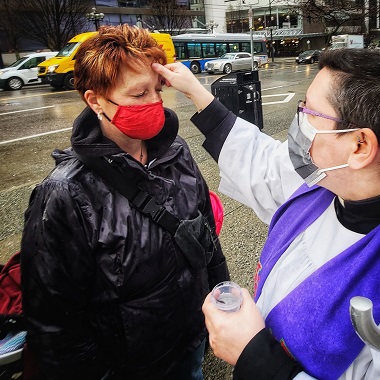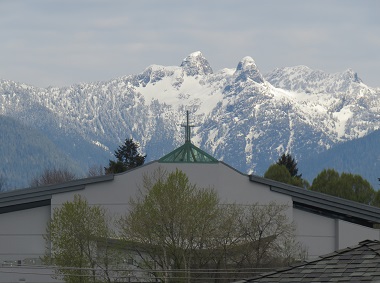
Ross Lockhart reminds us that “Jesus has walked every dark road before us.”
Creating Conversation is a weekly editorial, curated by the Centre for Missional Leadership, that gives opportunity for people to speak about issues they believe are vital for the church in Vancouver.
One of the goals of this weekly article is to spark dialogue – and action.
We invite you to join the dialogue here on the Church for Vancouver website. We also invite you to use the article as a discussion starter with your small group, church staff, friends and your neighbours. Thanks for participating in the conversation!
“It was now about noon, and darkness came over the whole land until three in the afternoon. . . .”
I was thinking of this Good Friday passage from Luke 23: 44 the other day as I sat mid-day in my office at St. Andrew’s Hall, all the lights turned up and rain lashing at the window. While signs of spring around us are encouraging, and the opportunity to bring the golf clubs out of the garage offers the winter weary Vancouverite encouragement, there is something that makes this Lenten season feel heavier and a bit darker than years gone by.
Lent is a 40-day journey with Jesus that moves the Christian community towards the emotional week the church calls Holy, through the depths of despair on the Friday God calls Good, before once again surprising us with resurrection joy on Easter Sunday, the dewy garden grass still wet beneath our feet.
Lent is not something that every Christian community observes, however, and certainly growing up in a Reformed Christian tradition I recall Lent as something that only my Roman Catholic neighbours seemed to mark.
After all, John Calvin was not a big fan of the 40-day season, calling Lent a “superstitious observance” whereby the “vulgar imagined that they thereby perform some excellent service to God, and pastors commended it as a holy imitation of Christ; though it is plain that Christ did not fast to set an example to others.”
But Lent has been reclaimed by many Christian traditions over the last several decades, beginning the journey to empty cross and empty tomb with the earthiness of Ash Wednesday, thereby acknowledging our human mortality in a death-denying culture that prizes beauty along with anti-aging cures.
As Hamilton, Ontario church planter Kevin Makins notes in his book Why Would Anyone Go to Church? Lenten practices are being reclaimed from mainline to charismatic traditions in ways that resist the dominant culture.
“That’s what makes Ash Wednesday the only religious holiday no corporation wants,” writes Makins, “You can’t sell ‘Remember, You’re Going to Die’ cards. The good news of Ash Wednesday comes after the bad news. It invites us to remember our frailty, count our days, and then put our trust in Jesus, who has overcome death.”

Rev. Clare Morgan distributing ashes in front of Christ Church Cathedral at Burrard and Georgia. Photo: Lauren Odile Pinkney
Somehow, this Lent seems especially dark. After two years of global pandemic people are tired. Are you tired? Add to that explosive inflation eating away at people’s ability to pay monthly bills, gas up their car and feed their families.
Oh, and not to mention a heart-breaking and devastating war in the Ukraine between two nations that self-identify as Christian, and it is easy to see why people are ready to give up hope.
I don’t know about you, but I find people especially ‘brittle’ these days. After giving up so much over the last couple of years, I find people are socially strained and brittle in their emotions and human interactions.
The Lenten road of 40 days feels much longer this year, almost as if it stretches back to a world we can hardly remember now in early 2020.
For those who know something of Lent, there is a tradition of ‘giving something up.’ Sometimes people give up chocolate, alcohol or some other part of their routine as a way of focusing on their journey with Jesus to Easter. I have been known to quip, “I’m giving up self-denial this year for Lent.”
But this year, the call to ‘give up’ for Lent sounds different. Pastors I speak with talk about the slow return to in person worship and wonder if many in their congregation have ‘given up’ on Sunday attendance.
Some friends and neighbours I talk to speak about how their relationships have been altered due to the questionable behaviour of family and friends during the pandemic, forcing them to ‘give up’ on old connections.
Some people talk to me about their disillusionment with institutions – including the government and church – and describe the temptation to ‘give up’ on hope for the ways in which we can work together for the common good.
What are you tempted to give up on in this moment?

If this season of Lent is feeling particularly dark, I invite you to lean into the journey that Jesus makes from the transfiguration mountain up to Jerusalem in those final days.
Throughout the four gospels’ witness of Jesus’ final earthly days, we see a journey and a Saviour who knows what it means to travel into the heart of darkness. By doing so, we are reminded that we do not walk this Lenten road alone.
Whenever I’ve taken pilgrimage groups to Israel, at some point we always end up at the Church of St. Peter in Gallicantu, built on top of site of the house of Caiaphas the high priest where Jesus was imprisoned before his trial and crucifixion.
In the dungeon below, one can feel the darkness and despair all around, as the words of Psalm 88 ring out:
Lord, you are the God who saves me;
day and night I cry out to you.
I am overwhelmed with troubles
and my life draws near to death.
You have taken from me friend and neighbour –
darkness is my closest friend.
Even in the midst of the darkness, however, there is the assurance that Jesus has walked every dark road before us. The same assurance he gave Cleopas and friend on the road to Emmaus at the end of the Lenten journey.
Living as a baptized disciple of the risen Lord Jesus in Vancouver today does not make the reality of this fallen world’s darkness any less harsh or troubling. And this year, there are an increasing number of factors that might weigh heavily on our hearts and minds.
Yet, our trust remains in the One who brings life out of death, joy out of mourning and light out of darkness. How will you live and share that good news this year as we wish one another a dark Lent and a bright Easter?
Ross Lockhart is Dean of St. Andrew’s Hall and Professor of Mission Studies at Vancouver School of Theology. Ross is co-author of Better than Brunch: Missional Churches in Cascadia (Cascade Books, 2020) and editor of Christian Witness in Cascadian Soil (Cascade Books, 2021).
